Tuesday, September 23, 2025
With the permission of Victoria Strauss and writer beware I’m re-printing a recent blog and warning that Victoria put out about the continuing Scams that many of you are getting hit by within not only Texts, but your emails.
Remember if it sounds just too good to be true it isn’t…

 A few weeks ago, I wrote about a rising and extremely prolific marketing scam that I’ve been able to trace back to operators in Nigeria.
A few weeks ago, I wrote about a rising and extremely prolific marketing scam that I’ve been able to trace back to operators in Nigeria.
Using highly personalized (AI-generated) email solicitations that make it seem the sender (always with a Gmail address, always presenting as a marketing or PR expert) has really read the book, the scammer offers marketing services of various kinds, usually for a not-exorbitant fee of a few hundred dollars. If the author bites, they’re referred to a Nigerian “assistant” or “payment processor” on Upwork or Fiverr for payment. The scammer then demands access to the author’s KDP account.
I’ve since discovered two new and distinct iterations of this scam–both of which, like the first one, have appeared abruptly and spun up very fast.
Fake Book Clubs/Book Club Impersonations
Just in the last two weeks, I’ve heard from nearly two dozen writers who’ve received emails purportedly from local book clubs, offering features or spotlights for the writers’ books.
In some cases, as the example below, the book club appears to be fictional, with no trace of it to be found online. (I’ve redacted not just the author’s name and title of the book, but the personal details mentioned in the fourth paragraph.) Notice how sloppy this is: the club has one name at the beginning of the message, and another in the signature.
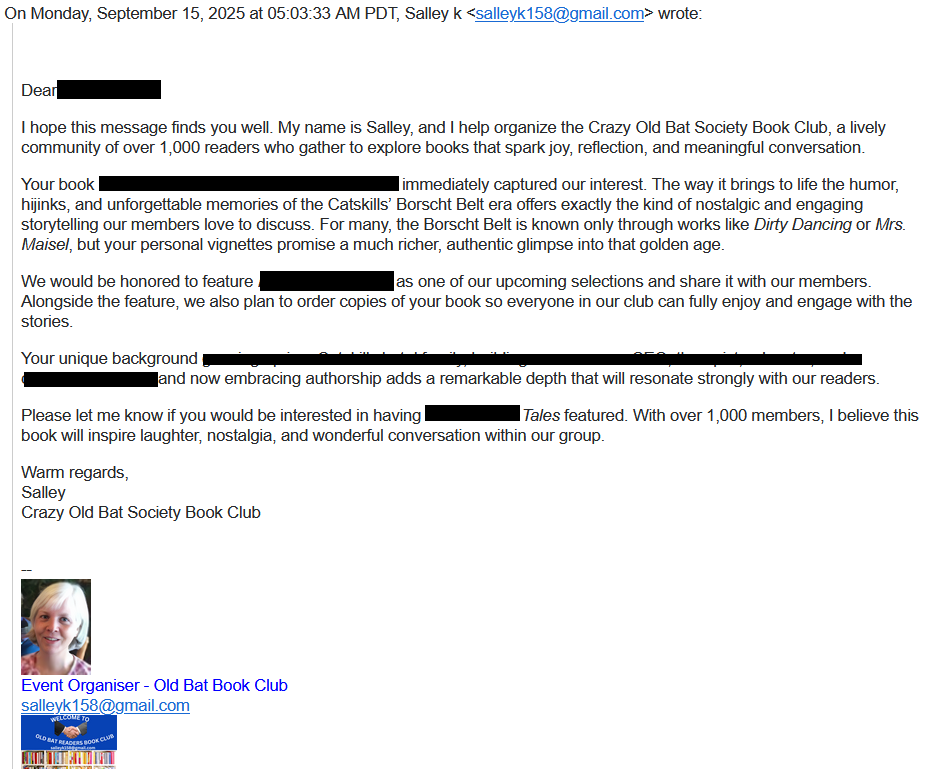
In other cases, the book club is real, with a presence on Meetup.com–as in this shorter and less personalized (and more authentic-seeming) email supposedly from Mocha Girls Read (a real representative of Mocha Girls Read has confirmed that this is an impersonation of both the club and the organizer):
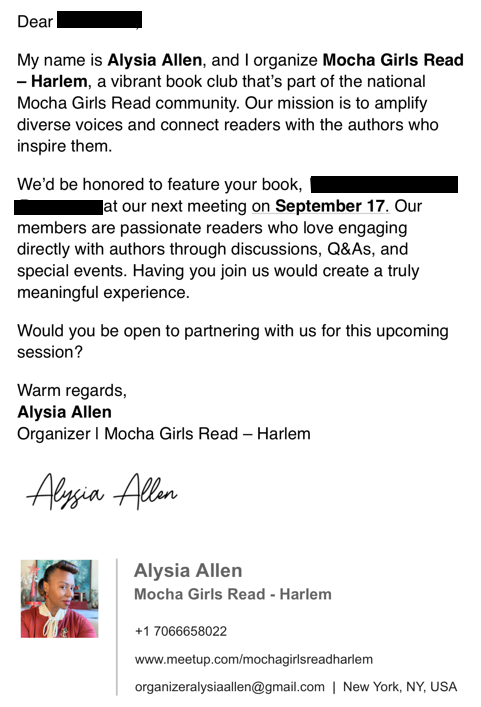
The catch, as you’ll doubtless have guessed, is that the author has to pay a fee for their appearance, variously described as a “spot fee” or a “spotlight fee” or a “spot-securing fee” or a “participation fee”. (Needless to say, real book clubs don’t charge fees to their guests). Amounts reported to me range from $55 to $350. In one case, the scammer offered three “spotlight packages”: Basic, Essential, and Premium, for between $100 and $200.
Payment options also vary, with some scammers encouraging payment via the friends and family option on Paypal (scammers like this option because the payments can’t be reversed). Others offer to send invoices. As appears to be typical of Nigerian writing scams, the invoice arrives in the form of an Upwork contract from a third party–like this one, presented to the writer who received the first solicitation above:
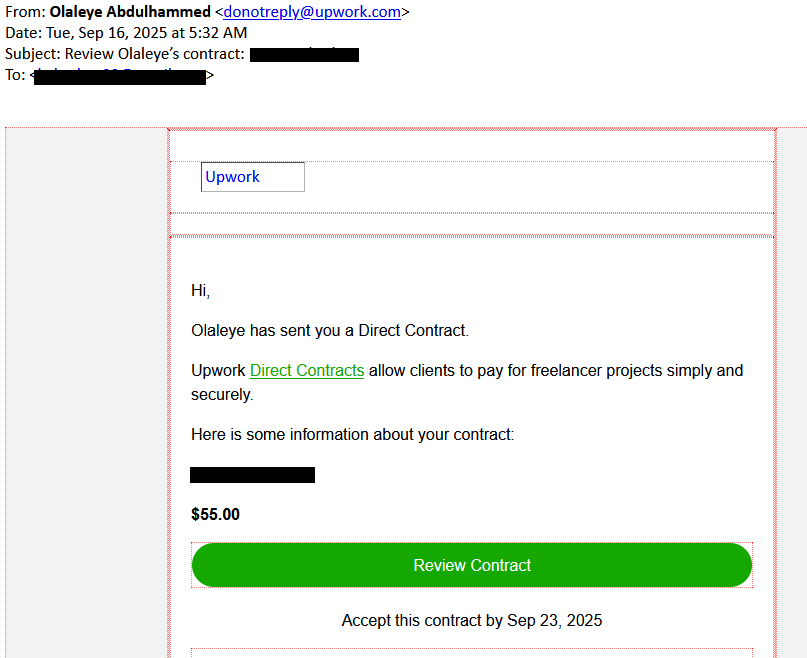 Here’s Olaleye Abdulhammed’s profile:
Here’s Olaleye Abdulhammed’s profile:
 I haven’t heard from anyone who has actually paid into this scam, so I don’t know what happens if you send the money. Do the scammers disappear? Do they set up some kind of fake event? Do they pressure writers to lay out more cash for some other good or service? I imagine I’ll find out eventually, so stay tuned.
I haven’t heard from anyone who has actually paid into this scam, so I don’t know what happens if you send the money. Do the scammers disappear? Do they set up some kind of fake event? Do they pressure writers to lay out more cash for some other good or service? I imagine I’ll find out eventually, so stay tuned.
There’s been some discussion of the scam on Reddit. One poster mentions fake testimonials from real authors; I heard from author T. Kingfisher, who confirmed that her name was falsely used as a reference by the club scammer in the first email example above, with a fake email address that, when contacted, provided a predictably glowing and entirely bogus review.
Some book clubs are now posting warnings on their social media and Meetup pages.
Fake Private Review Groups
A characteristic of the Philippine and Pakistani scams I’ve written so much about on this blog is that they focus almost exclusively on writers who’ve self-published or who are seeking self-publication. Writers like me, who’ve only ever published traditionally, are hardly ever targeted.
The Nigerian scams are different: they target anyone with a published book. As a result, I’ve suddenly started to receive the kinds of scam solicitations that have been driving self-pubbed writers nuts for years. So this saga of yet another Nigerian PR scam is brought to you not by an author whose name and book title have been carefully redacted, but by…moi.
This scam sends out elaborate email solicitations pitching book reviews from private communities of (supposedly) thousands of passionate book lovers. Of course it’s not free: reviewers get a “tip” of anywhere from $20 to $30. That may not sound like a lot, but you have to commit to a minimum buy of between 30 and 50 reviewers. So not such a small investment after all.
Here’s the solicitation I received at my personal email address. It’s typical of the type, including the extensive (and pretty accurate) personalization, over-the-top flattery, lashings of emojis, and faux-edgy style. (Note to scammers: Chatbots can generate flawlessly grammatical English and incorporate perfectly correct details, but they can’t warn you which parts of a person’s resume should alarm you.)
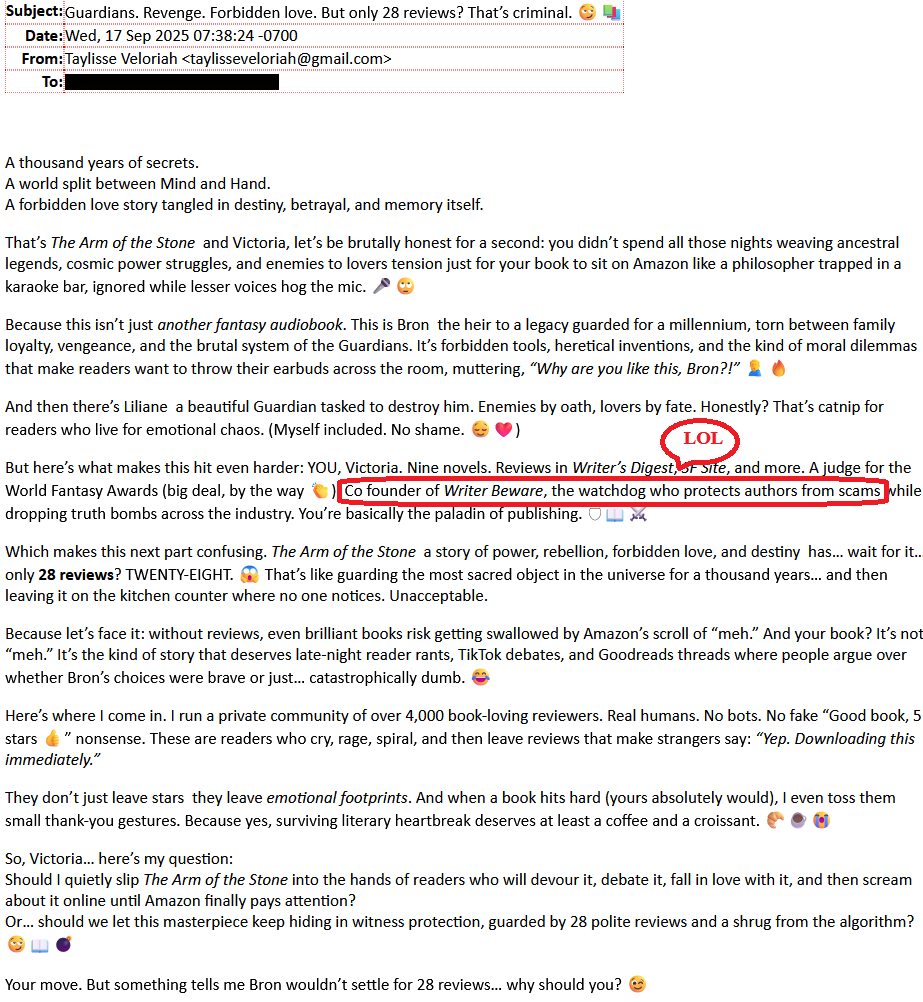 I responded, in the guise of an enthusiastic but clueless writer. Such kind words! Please, tell me more! Almost immediately “Taylisse” wrote back with the money ask.
I responded, in the guise of an enthusiastic but clueless writer. Such kind words! Please, tell me more! Almost immediately “Taylisse” wrote back with the money ask.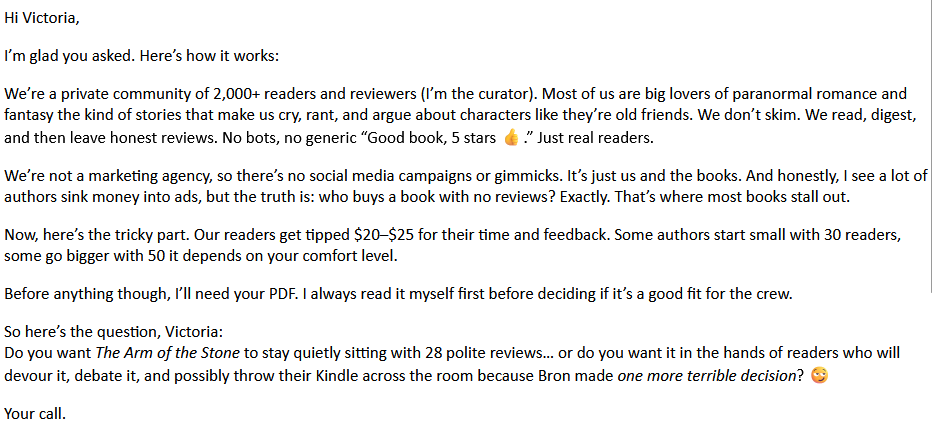
Notice that the number of readers in this supposed private community has changed–2,000 as opposed to 4,000 in the original solicitation, a scam tell if I ever saw one–and that I’m being asked for a PDF. Although I’ve yet to receive any credible complaints of intellectual property theft by a foreign scammer, I would NEVER EVER under any circumstances recommend sending a PDF of your book to anyone you aren’t absolutely 100% certain is legit (and even then, be sure you know exactly why and are comfortable with the request).
Anyway, I enthusiastically replied to say that I was in! Sign me up for 30 readers at $25 each! But, but…I was hesitant about the PDF. Could I send a paperback instead? Taylisse, or whoever it is that inhabits her persona, was okay with that: a paperback was fine, and she’d send me her mailing address. Also, her “payment manager” would be forwarding me a contract for payment.
Within minutes, the contract arrived.

Here is Adegoke Benjamen’s Upwork profile (even though his bio mentions Fiverr):
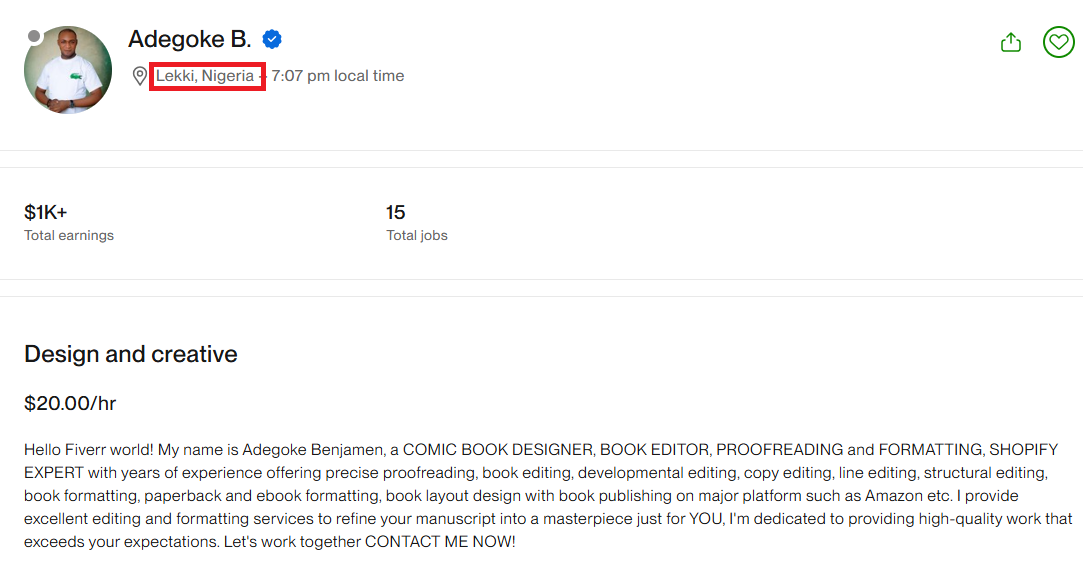
I emailed Taylisse again, this time in Puzzled Clueless Author mode. Gosh, I was surprised to see the payment manager was from Nigeria–did that mean this wasn’t a US-based readers’ community? Sometimes, when you force a foreign scammer off-script–especially when they’re eager for you to just shut up and pay–they don’t bother feeding their response through ChatGPT, at which point their lack of written English skills becomes apparent.

Quite a difference from email #1. She never did send me her mailing address, either.
The Philippines, Pakistan…and Nigeria
Once upon a time, most scams targeting English-speaking writers were based in the USA and Canada, with a scattered few in the UK and Australia. No longer.
These days, the vast majority of writing and publishing scams come from overseas. Re-publishing/marketing/impersonation scams from the Philippines. Self-publishing/ghostwriting scams from Pakistan. And now, gen AI-aided PR/promo scams from Nigeria.
Nigeria has long been a home for mail and email frauds, but the frauds detailed above and in my previous post are new, and as noted at the beginning of this article, they have spun up extremely fast. I began getting sporadic reports of them in June; now I’m hearing about them multiple times a day. The iterations come in waves: the basic PR ones appeared in June, the private review circle ones (which now outnumber the basic PR ones) arrived in August, and the book club ones showed up just over two weeks ago.
The good news–I think, anyway–is that the scammers may be sabotaging themselves by mounting such an intense spam campaign. This ensures that any given writer will receive multiple solicitations–sometimes multiple times a day–which tends to spark suspicion and leads to discussion on social media…spreading the word, but not in a way that benefits the scammers. The over-the-top flattery can also backfire, not just because it’s so absurdly overblown but because, thanks to the way chatbots consume and spit out details, the solicitations soon start to seem very repetitive. Get three or four emails like Taylisse’s or the examples in my previous post, and it’s very hard to take them seriously.
I suspect this is why, despite the enormous number of reports I’ve gotten of these scams, almost all come from writers who have already pegged them as scams (see, for example, the two Reddit posts linked in above). I’ve heard from only a handful of authors who actually went as far as paying…and only at the very beginning of the wave.
Here’s to scam awareness. As I’ve written before, it’s empowering.

Victoria Strauss
beware@sfwa.org
Victoria Strauss, co-founder of Writer Beware®, is the author of nine novels for adults and young adults, including her Way of Arata epic fantasy duology (The Burning Land and The Awakened City), and a pair of historical novels for teens, Passion Blue and Color Song. She has written hundreds of book reviews for publications such as SF Site, and her articles on writing have appeared in Writer’s Digest and elsewhere. In 2006, she served as a judge for the World Fantasy Awards. She received the 2009 SFWA® Service Award for her work with Writer Beware®, and in 2012 was honored with an Independent Book Blogger Award for the Writer Beware® blog. She’s webmistress of the Writer Beware® website, which she also created, and maintains the Writer Beware® database, blog, and Facebook page.